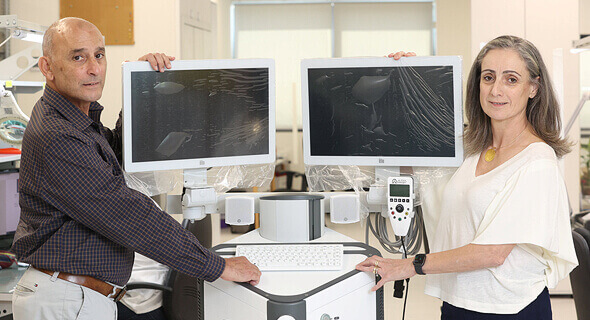
Alpha Omega, a revolutionary biomedical startup from Nazareth is valued at hundreds of millions of dollars and is writing a new and fascinating chapter in Israeli high tech history
When Reem and Imad Younis launched the technological system they developed, it filled the biomedical community with hope and excitement. The system’s great potential, which started a revolution in intracranial navigation during operations, immediately captivated many. Naturally, all the excitement and wonder raised several eyebrows: when a senior Israeli brain researcher sent an exclamatory email to his colleague overseas, sharing the news of the system, the colleague asked where the company’s offices are based, and thought the researcher was joking.
The address was Maayan Mariam Square in Nazareth, a place that has long been considered a holy religious pilgrimage site for Christians, and differs drastically from the high tech hub in central Israel. The company’s idea was born in the home of young Arab engineer Imad Younis in 1993. Over the past few years, the company has become a leader in the field of surgical intracranial navigation, and has also created lab equipment for conducting brain research. The company owes its success to its founders Imad (60) and his spouse Reem (57) who opened Nazareth’s gates, turning the city into the capital of the Arab high tech industry in Israel, which today houses no less than 70 companies.

Due to these impressive achievements, Reem and Imad were awarded the 2018 Industry Leaders Medal, at a special ceremony that took place at the Israeli President’s Residence in Jerusalem. But despite their breakthrough success, Alpha Omega remains private, and is owned by family, preserving its intimate character. Currently, it only employs 120 people – 48% of them women compared to the average of 33% in Israeli high tech. “We’re a small company that’s playing in the big leagues,” Imad said during an interview with Calcalist. “Our customers are Medtronic, Boston Scientific, or Abbott Laboratories, so people have high expectations from us. Surgeons who use our system don’t mind how many employees we have, or whether we’re from Nazareth or New York.”
And the number of surgeons using Alpha Omega’s smart system is growing. It already operates in over 200 different hospitals around the world, and has been used in a large number of life-changing brain surgeries.
What exactly does your system do?
“In most cases, treating neurological and psychiatric diseases is based on trial and error: the doctor tries a certain medication and examines what effect it has on the patient,” Imad explained. “It’s really difficult, because you need to play around with the dosage, which sometimes causes side effects.” In order to overcome this challenge, researchers developed the Deep Brain Stimulation (DBS) process, a procedure that does not require medication in which a medical device – a neurostimulator complete with electrodes – is implanted in the brain and sends electrical impulses to specific areas of the brain. This stimulation could lessen worsening motor symptoms of neurological diseases like Parkinson’s disease or epilepsy.
Unlike a broken hand, however, which can be spotted from a mere X-ray, brain issues are far harder for doctors to diagnose, since they can’t see into the human brain. In order to do so, they must implant an electrode which can navigate the brain’s pathways, and that’s where Alpha Omega enters the picture. The company creates a separate electrode, which is inserted into the brain via a nail into the skull, and helps surgeons put together a “map” which helps point to the area that needs treatment. Alpha Omega’s technology is swift and precise, which is critical during such operations. “We simplify surgeries,” Imad specifies. “The surgeon can look at MRI images or CT scans, but deciphering neuron activity is tricky. The algorithm we developed analyzes neurotransmitters once the electrode penetrates the point of treatment, and our system builds a picture or an actual map. It enables the surgeon to find the best spot to implant the electrode.”
Once the system spots the problematic area, the surgeon can add additional electrodes (which are created by Medtronic, Boston Scientific, Abbott, and others) that remain inside the brain. A subcutaneous pacemaker, implanted later, activates the permanent electrode, which transmits nerve impulses instead of damaged nerve cells to treat the disease. “After implantation, our system gives neurologists and psychiatrists more options to treat patients: health professionals can try different medications or DBS – and send stronger or weaker pulses.”
The system starred in former Israeli government minister and Likud MK Michael (Miki) Eitan’s surgery, who was diagnosed with Parkinson’s. Since his diagnosis four years ago, the 77-year old politician had become a shadow of his former self – no longer lively, slow-paced, bent over, and shaky. But the surgery brought him back to life, and on a segment broadcast on Israeli television last month, he was shown skipping at home, playing ping pong on the beach, and speaking with the same fluency and alertness which characterized his political career.
“My father didn’t live to receive our treatment”
While the Younis couple is goal-oriented, they’re also a charismatic duo with a sparkle in their eyes. They’re also very loyal to their employees, with nearly a third of their senior management having accompanied Alpha Omega since its founding 28 years ago. They’re also very connected to their Christian Arab community, something that is hinted at from their company’s name. Alpha Omega denotes the first and last letter of the Greek alphabet, and together serve as a godlike symbol in Christianity, signifying the beginning and end of all. But when asked why they chose such a name, Reem provides a far more prosaic explanation. “When we started the company, we didn’t intend for it to be a startup, rather just another subcontractor in the high tech industry. We thought that companies would order our equipment or services, and we’d provide them everything from A to Z – from alpha to omega.”
When Reem is in the operating room next to a Parkinson’s patient, one can only imagine she must wonder what may have been had they developed their technology earlier. Her father, Wadia, developed Parkinson’s when she was a child, and was shuttled from place to place for treatment. In 1995, after three decades of coping with the disease, he passed away, which was “only two years after we founded the company,” she says sadly at the beginning of our conversation. “He didn’t last long enough to receive our treatment. That is the irony of life.”
However, her father did manage to raise a determined woman, who loves challenges, and who never desired to belong to the mainstream. At 18, Reem began pursuing a bachelor’s degree in industrial engineering at the Technion Institute of Technology, and there she met her husband, another Christian Arab, who was a senior college student and electrical engineering major.
The couple founded Alpha Omega when they were already parents to Dima, their eldest daughter, who today at 30, serves as Product Specialist and manages the company’s international marketing. Their other children also work for the company, including son, Jude, 25, as Business Development Associate and their youngest daughter, Nada, 18. In parallel, they also founded Alpha-Cad Ltd., a company that provides software solutions for engineering, which was later sold. To make an initial investment, they sold their family car and four gold coins that Imad received from his father in case of a “rainy day.”
At the beginning of their journey, the Younises cooperated with two of the leading figures in the DBS arena – doctor and brain researcher Prof. Hagai Bergman from the Hebrew University of Jerusalem, and French-Algerian brain surgeon Prof. Alim Louis Benabid, who is a fellow at the French Academy of Sciences.
“In Bergman’s post-doctorate which he wrote in the late 80s, he found that Parkinson’s disease could be treated in monkeys, if a small portion of their brain – termed the subthalamic nucleus – was lesioned,” Imad says. “In 1994, Benabid conducted the first such operation on a human to treat essential tremors (the most common symptom in neurological tremor disorders), but his team faced a problem: their intracranial navigation was based on CT, MRI scans, and the like, which weren’t precise enough. In 1997, we reached out to them and offered use of our navigation system which is based on neurotransmitters.” In 1999, they sold their first system in Europe, and a year later entered the U.S. market. In 2002, the Younis couple relocated to the United States for two years with their three children to open the company’s American branch.
But the company’s real turning point came two years ago: in 2019, only a year after it received its first external investment of $7 million (from the Chinese Guangzhou Sino-Israel Biotech Investment Fund earmarked for expanding the company’s operations in China), the American medical equipment company Medtronic dropped a bomb. It announced that it would be marketing Alpha Omega’s systems worldwide, and in one swift move knocked out all of the company’s market competitors, including its own. “Medtronic recognized our system’s technological and clinical advantages, and decided to abandon their own system and instead sell ours,” Imad revealed. “We are continuing to conduct our own marketing and sales, but they opened the entire world to us. That allowed us to think like leaders.”
And that thought encouraged them to spread the news of DBS around the world. “This treatment is included and covered in the standard healthcare package in Israel, the U.S., and Europe, but it only reaches 10% of the potential population it could help,” Imad says.
